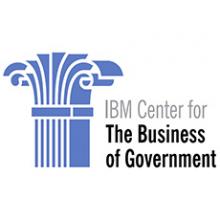Dan Chenok is Executive Director of the IBM Center for The Business of Government. He oversees all of the Center's activities in connecting research to practice to benefit government, and has written and spoken extensively around government technology, cybersecurity, privacy, regulation, budget, acquisition, and Presidential transitions. Mr. Chenok previously led consulting services for Public Sector Technology Strategy, working with IBM government, healthcare, and education clients.
Mr. Chenok serves in numerous industry leadership positions. He is a CIO SAGE with the Partnership for Public Service, Fellow of the National Academy of Public Administration, Chair of the Cybersecurity Subcommittee of the DHS Data Privacy and Integrity Advisory Committee, Member of the Auburn University Center for Cyber and Homeland Security Board of Directors, Member of the American University IT Executive Council, and Co-Chair of the Senior Executives Association  Community of Change for Governance Innovation; previously, he served as Chair of the Industry Advisory Council (IAC) for the government-led American Council for Technology (ACT), Chair of the Federal Information Security and Privacy Advisory Board, and two-time Cybersecurity commission member with the Center for Strategic and International Studies. Mr. Chenok also generally advises public sector leaders on a wide range of management issues. Finally, Mr. Chenok serves as an Adjunct Associate Professor with the LBJ School of Public Affairs at the University of Texas in Austin, teaching at the school's Washington, DC Center.
Community of Change for Governance Innovation; previously, he served as Chair of the Industry Advisory Council (IAC) for the government-led American Council for Technology (ACT), Chair of the Federal Information Security and Privacy Advisory Board, and two-time Cybersecurity commission member with the Center for Strategic and International Studies. Mr. Chenok also generally advises public sector leaders on a wide range of management issues. Finally, Mr. Chenok serves as an Adjunct Associate Professor with the LBJ School of Public Affairs at the University of Texas in Austin, teaching at the school's Washington, DC Center.
Before joining IBM, Mr. Chenok was a Senior Vice President for Civilian Operations with Pragmatics, and prior to that was a Vice President for Business Solutions and Offerings with SRA International.
As a career Government executive, Mr. Chenok served as Branch Chief for Information Policy and Technology with the Office of Management and Budget, where he led a staff with oversight of federal information and IT policy, including electronic government, computer security, privacy and IT budgeting. Prior to that, he served as Assistant Branch Chief and Desk Officer for Education, Labor, HHS, and related agencies in OMB's Office of Information and Regulatory Affairs. Mr. Chenok began his government service as an analyst with the Congressional Office of Technology Assessment, and left government service at the end of 2003.
In 2008, Mr. Chenok served on President Barack Obama’s transition team as the Government lead for the Technology, Innovation, and Government Reform group, and as a member of the OMB Agency Review Team.
Mr. Chenok has won numerous honors and awards, including a 2010 Federal 100 winner for his work on the presidential transition, the 2016 Eagle Award for Industry Executive of the Year, and the 2002 Federal CIO Council Azimuth Award for Government Executive of the Year.
Mr. Chenok earned a BA from Columbia University and a Master of Public Policy degree from Harvard's Kennedy School of Government.
*******************************************************************************************************
 John Kamensky is a Senior Fellow with the IBM Center for The Business of Government and an Associate Partner with IBM's Global Business Services.
John Kamensky is a Senior Fellow with the IBM Center for The Business of Government and an Associate Partner with IBM's Global Business Services.
During 24 years of public service, he had a significant role in helping pioneer the federal government's performance and results orientation. Mr. Kamensky is passionate about helping transform government to be more results-oriented, performance-based, customer-driven, and collaborative in nature.
Prior to joining the IBM Center, he served for eight years as deputy director of Vice President Gore's National Partnership for Reinventing Government. Before that, he worked at the Government Accountability Office where he played a key role in the development and passage of the Government Performance and Results Act.
Since joining the IBM Center, he has co-edited six books and writes and speaks extensively on performance management and government reform. Current areas of emphasis include transparency, collaboration, and citizen engagement. He also blogs about management challenges in government.
Mr. Kamensky is a fellow of the National Academy of Public Administration and received a Masters in Public Affairs from the Lyndon B. Johnson School of Public Affairs, in Austin, Texas.





